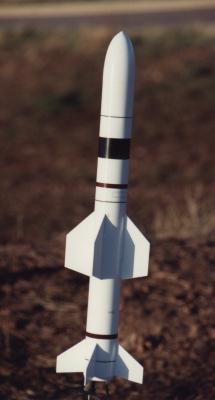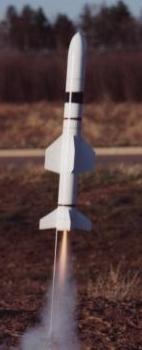| Construction Rating: | starstarstarstarstar_border |
| Flight Rating: | starstarstarstarstar |
| Overall Rating: | starstarstarstarstar_border |
| Manufacturer: | The Launch Pad  |
 Brief
Brief
This is an approximately 1/5th scale model of the Harpoon anti-ship missile.
Construction
My kit arrived in a "standard" long plastic bag. All parts were accounted for, and in good shape. The body tubes appear to be standard BT-80, and the nose is a PNC-80B. There were a couple of nice sheets of balsa for the fins, plus some strips for making some of the detailing. The included recovery system consists of a mylar chute, complete with snap swivels, etc.
The instructions are straightforward, and easy to follow. There are a couple of drawings to illustrate positioning of various elements, as well as to help with placement of markings on the finished product. Templates are included for the two different fin sets, but TLP has neglected to include a fin marking guide (I snarfed one out of my Estes Phoenix kit). Launch lug placement is left to the whim of the builder- it isn't even discussed in the directions.
After the amount of effort required on my last TLP kit (the Sidewinder), I was braced for more of the same here. I was quite shocked at how easy this bird went together! A bit of care is needed assembling and installing the boat tail and the paper "hat" on the nose, but the rest of the kit was a breeze.
Finishing
As with all TLP kits (to date, anyway), no decals are included. They do provide some painting information, including two different schemes.
I ran into two problems during this stage: First of all, I accidentally sanded the tip off the paper shroud on the nose (and I wasn't sanding hard, either). I filled the resulting hole with some Fill 'n Finish, sanded that, and then soaked some CA into it, just to be sure. The other problem is one of the suggested detailing techniques. The instructions call for the builder to CA 150 pinheads in place in various locations on the rocket. I have patience, but there's a limit! I found a good work around, however: One of the R/C aircraft companies produces a sheet of 1/5th scale decals (dry transfer). I picked some up, and they work fine!
Construction Rating: 4 ½ out of 5
 Flight
Flight
So far I've had one flight with the Harpoon, and I was impressed. I loaded the recommended 1st flight motor, an Estes D12-5, and hoped for the best.
I was not disappointed! The missile lifted off at a nice speed- fast, but slow enough to watch and appreciate. Ascent was arrow-straight, with no arcing during powered flight.
Recovery
The chute deployed at apogee, and the mylar chute brought the ship down safely. It looked a bit quick, but no damage occurred (not a scratch!).
I'm still a bit iffy on the TLP way of securing the nose to the shock cord (with a bit of thread), but I've had no problems so far.
Flight Rating: 5 out of 5
Summary
I'm very pleased with my Harpoon. It's a smart looking rocket, and the kit is challenging, but not frustrating.
It's not as complicated to build as some TLP kits, and is perhaps a decent introduction to their line of products. Some modelers may have trouble with the paper cone and boat tail, but the key is to go slow, and pay attention to the suggestions in the instructions.
The quality of materials is quite good. I'm beginning to appreciate the mylar chutes that are included- they seem far more resistant to ejection charge damage than plastic. My only quibbles about the supplied parts are: (1) the inclusion of barely enough sheet balsa for the job. I can understand the reason for doing so, but it means really having to fiddle around to ensure you have enough for all the fins. (2) The lack of a fin marking template of any sort. This is easy enough to produce, and it can be printed right on the instructions (as Estes Does). (3) Finally, the lack of any decals for finishing. The instructions suggest cutting the heads off 150 pins and CA-ing then in place on the rocket. Neat idea, but extremely time-consuming, and for folks like me, would require lots of debonder! I opted for a sheet of dry-transfer rivet decals from Carl Goldberg, an R/C airplane manufacturer. They worked great.
Overall Rating: 4 ½ out of 5
Other Reviews
- The Launch Pad Harpoon AGM-84 By Darrell Tardy (February 6, 2008)
A roughly 1/5th scale model of the air-launched version of the HARPOON missile, designed for the modeler. Some skills required for optimum appearance results but otherwise easy to build and fly. My Harpoon kit arrived in a small package for what promised to be a big kit. Everything was there, good quality tubes, and a neat purple Mylar parachute (which works well and is easy to see), but ...
- The Launch Pad Harpoon AGM-84 By Mike Kent
The Harpoon is a scale model of a US Air-Launched Anti-Ship Missile, The Launch Pad's kit is an excellent first mid power and scale rocket. I was so glad when I finally got my hands on my AGM-84 Harpoon. One of the members of my club was going down to the US and was kind enough to bring it back for me. I received the Harpoon with all pieces present, in good condition, and good quality. I have ...
 |
 |
Flights
 |
 |
J.C. (October 1, 2000)
D.P. (February 24, 2002)
B.Z.H. (October 11, 2002)
Sponsored Ads
 |
 |












J.D. (September 1, 2000)